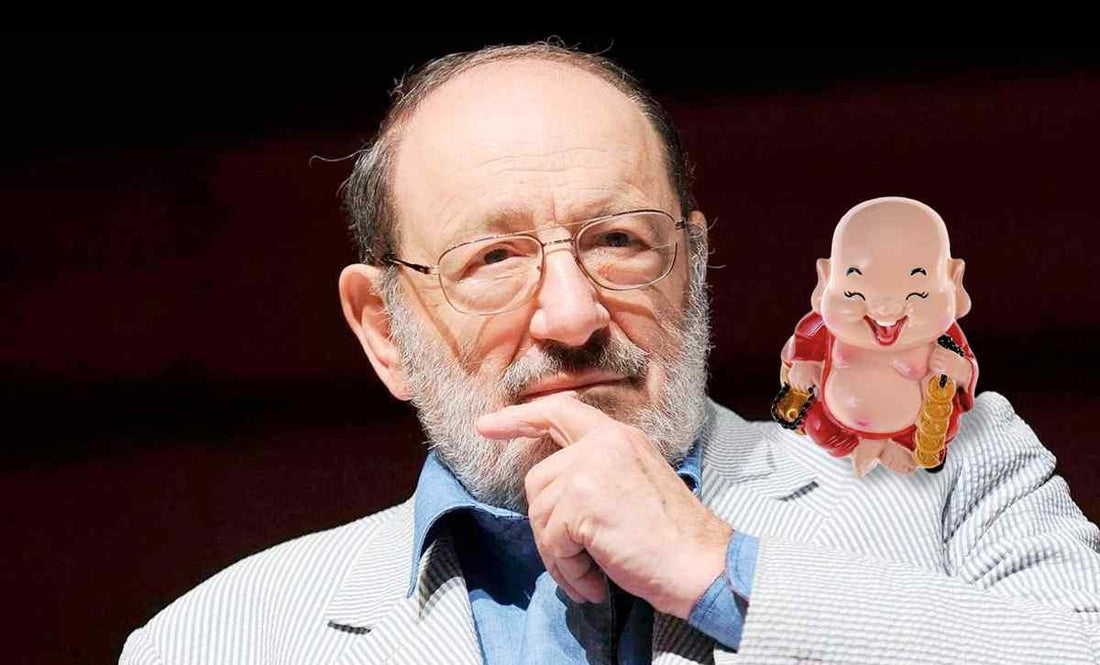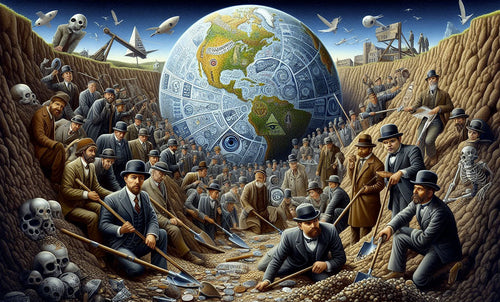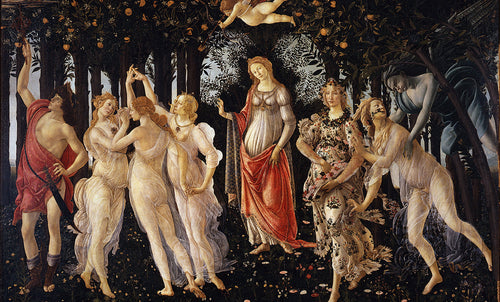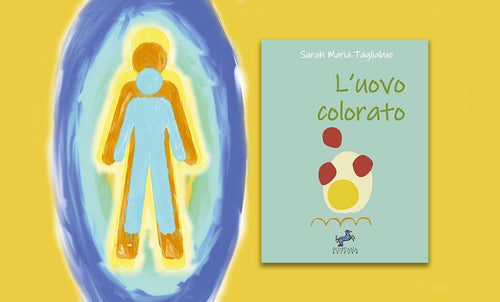
The Terrifying Effect of Zen on Umberto Eco
Leonardo AnfolsiYears ago I bought a certain edition of Alan Watts ' "Zen" out of curiosity, precisely because it contained an introduction by Umberto Eco. I would have expected anything but what I read, and yet if we ask ourselves why Umberto Eco chose Borges for the part of the villain in his The Name of the Rose, well, the answer would not be very humorous but rather too obvious: everything that does not remain still under a microscope - even if it were a humanist/semeiotic microscope - would be for Eco a form of occultism and therefore of para-Nazi coprophilia. Zen included.
Then Eco can also be funny, irreverent, sui generis but he is no joke in this regard.
In fact, Eco stood out in those pages on Zen for a certain annoyance; I point out that I read what was written and that was it, since I was not and am not ideologically aligned with Eco, neither for nor against, nor was I towards what the “Eco monument” should represent. Try to understand my criticism not as an exorcism in the name of another “truth”, but rather as a gust coming from the morning freshness of the reality that we are all breathing now; they are two different mathematical operations, Eco adds, I take away even if I say, also because while I say, I laugh.
I know well the terror-panic that this elusive identity-non-identity, so often confused with a super-identity, creates in dogmatic minds.
In the analysis of the Lombard intellectual, apart from the sensible references to Wittgenstein and Husserl, and the always pleasant ability to elaborate and expose his own ideas, the reader is severely convinced that Zen is a sworn enemy of the imposed scientistic order; for Eco, Zen is a sort of reincarnation of the second law of thermodynamics, yes, the one relating to entropy. This, however unexpected and bizarre, is palpable in his own words; for Eco, koans and mondō are "...questions with absolutely random answers..." . This is already not bad as an entree, right? But make yourself comfortable, then comes the stuffed pheasant.
A question arises spontaneously: where did Umberto Eco get his information about Zen? You would think he read Suzuki, at least!, if not Hisamatsu, or maybe others from the “Kyoto School”, right? Who supported him in his scientific hatred of Zen? You have to go and read Ernest Becker to understand the problem, because it is Becker that Eco has elaborated in a “critical” way. Let's get there one step at a time.
Here is the list of Zen allergens that make Eco itch, reeled off using the most treacherous techniques of Neuro Linguistic Programming; to explain, here Eco does not use NLP techniques to educate the child non-invasively, nor those to sell, but precisely those techniques that kill, those to delegitimize the interlocutor by smiling at him but implying that he is an idiot , in this case using truisms, generalizations and finally inevitable implications [mine are the amusing square brackets in the manner of a Zen nemesis]: “As for speaking of an absolute validity of the Zen message for Western man, I would advance the most extensive reservations [why would Eco himself have an… “absolute” validity? ...In particular while he is explaining Zen to us of which he knows nothing?]. Even when faced with a Buddhism that celebrates the positive acceptance of life, the Western soul will always detach itself from it due to an ineliminable need to reconstruct this accepted life according to a direction desired by intelligence [so I and the reader - since we meditate - are Imbecile & More Imbecile: good!]. The contemplative moment can only be a stage of recovery, a touching of mother earth to regain energy: Western man will never accept to lose his memory [with NLP he is still calling us idiots...] in the contemplation of multiplicity, but will always get lost trying to dominate it and recompose it [the poor nerd will certainly “try”!]. If Zen has reconfirmed to him with its ancient voice that the eternal order of the world consists in its fruitful disorder and that every attempt to organize life in unidirectional laws is a way of losing the true meaning of things, Western man will critically accept [they, we don't, so we remain idiots] to recognize the relativity of the laws, but will reintroduce them into the dialectic of knowledge and action in the form of working hypotheses [= Dharma + Upaya…?]. Western man has learned from modern physics [Macché: In Hoc Signo!] that Chance dominates the life of the subatomic world and that the laws and predictions that guide us to understand the phenomena of daily life are valid only because they express approximate statistical averages [which approximate to…? Achilles & the Tortoise non docet et non sufficit]. Uncertainty has become the essential criterion for understanding the world [he's more Zen than we are!]: we know that we can no longer say "at instant X electron A will be at point B", but "at instant X there will be a certain probability that electron A will be at point B " [Hmm, quantum physics but without entanglement! Furthermore, the electron would also be in itself a probability of presence or - as I was told - a shadow]. We know that each of our descriptions of atomic phenomena is complementary, that one description can oppose another without one being true and the other false [is the friend a possibilist, is he trying to disguise himself as a Buddhist in anticipation of throwing a punch?]. Plurality and equivalence of descriptions of the world [entanglement however algebraic, if not democratic, mmh! One more step and here is shunyata existentialized as "empty of meaning"!]. It is true, causal laws have collapsed, probability dominates our interpretation of things [the “causal” and the “probable” used as buoys or lids of thought, otherwise it vents = loses its memory]: but Western science has not allowed itself to be seized by the terror of disintegration [quantum existentialism; why not psychoanalyze the electron?]. We cannot justify the fact that probability laws can be valid [if you calculate the living being as probability you cannot avoid this]: but we can accept the fact that they work, says Reichenbach [of course, you invented them, optimized them, discovered them...]. Uncertainty and indeterminacy are an objective property of the physical world [metaphysics escapes you but you would be there as the initial variable: Well, Eco! Not even the evidence!]. But the discovery of this behavior of the microcosm and the acceptance of the laws of probability as the only means to know it, must be understood as a result of the highest order [of course if you can't do better: Nagarjuna with two sentences would have already taken the toy away from you, but who knows if you would have ever understood what he says...]. There is in this acceptance the same joy with which Zen accepts the fact that things are elusive and changeable [if you say so! Here is how NLPlistically makes us understand that it knows more than us] : Taoism [has read F. Capra!] calls this acceptance Wu [...But Snyder/Kerouac defined it better as “wuf!”]. In a culture secretly fertilized by this form of mind, Zen has found ears ready to welcome its message as a mythological substitute for a critical conscience [yours? Good night to the bucket! ...And thanks for defining us as uncritical thanks to the usual NLP]. There was found the invitation to enjoy the changeable in a series of vital acts rather than admitting it only as a cold methodological criterion [thanks for the merely physiological compliment]. And all this is positive [yay! Let's get excited!]. But the West, even when it joyfully accepts the changeable and rejects the causal laws that immobilize it, does not however give up redefining it through the provisional laws of probability and statistics [come on tell me what I think: in NLP it is called "tracing" and then comes "piloting"], because - even in this new plastic meaning - the order and the intelligence that "distinguishes" are its vocation [the order of science or the order of God: always making theological distinctions + it has given us back the "not very intelligent" compared to itself, obviously...]”.
Satisfied? I had a bit of fun being rude, have pity on me, not on Umberto Eco, who is and remains an example of incomparable genius. I wouldn't want to compare him, in fact, but instead I feel like it, reminding myself of how many have been damaged today by this doctoral dogmatism, which is certainly no less than the worst kind of religious dogmatism.
The idea of a “plastic meaning” is very cerebral; since he also imagines Zen as a minor - indeed idiotic - form of his religious-scientific dogma, we, obtuse meditators, should necessarily develop a greater mechanical/dental awareness of reality, some algebraic-axiomatic plasticity. Right? Eco is always right, now that I think about it, we Zen should all get a move on!
Let's get up to speed and get busy putting together a nice zen-science 0.3!
When "anything goes" and one can say whatever one wants from the chair one occupies, well, in this dimension it becomes clear that one could fart and receive a solemn praise deriving from the certainty that epistemology traces the contours of the ultimate truth, that is, of the scientific one.
From this it is clear that Buddhism has nothing to do with science, that is, with the "Truth" and in particular if this becomes a mass dogma; if anything, a Zen practitioner can deal with science, even have a career as a scientist, but he cannot - should not be able to - reason daily, structurally, in terms of a radical epistemological betrayal, which was perpetrated on the original etymology of the word "epistemology"; let's really go and look for it, with our hat in hand, therefore not to be satisfied with the enlightened fodder of Ferrier & Co. but going to the original idea of Parmenides, Aristotle and Plato, who never gave us permission to update them.
We seek the meaning of episteme by reading the classics, and therefore also the meaning of noesis and aletheia, which would already be enough to clarify that it is not a question of "science" but of the very silence of the eternal creation, integrated with the perception of living hypostases, it matters little whether they are mapped by Plotinus, Rinzai or the Lotus Sutra, because what is evoked here is a living, interactive interaction, and not only theoretically relative. All this is not complicated stuff at all, it becomes so when one struggles to translate it in terms of discursive thought and to betray it with the lack of a living operativity; and here is where Buddhism became eusebeia to be understood by the West already in the immediate post-Alexandrian antiquity, in the face of Eco who reinvents the history of Buddhism, yours and my sister's without batting an eyelid. And from here on is where science, implemented by caffeine and nicotine, stratified itself on the Christian dogma relating to an episteme-truth (hence doxa and no longer episteme), and where it got bogged down in the wait for some paraclete/artificial-intelligence.
[I wrote this paragraph for those who do not know Buddhism.] We should remember that Buddhism has no dogmas, by choice, but that it indicates the pure, ineffable, very clear experience; could I also remember that Buddhism is not waiting for anyone, nor that it goes from a prophecy toward some salvation? Even in devotional or salvific Buddhism, however, Amida's salvation, but also his vow, everything, happens now; and even in the practice of gongyo of the Nichiren schools one enters an impersonal and timeless state. Then I remember that Buddhism is not concerned with "grabbing the truth" but with opening our being to the naked, silent, explosive reality of what is as it is. My friends, what does "a mute's dream" have to do with "the particle of God"? Nothing, at the very least. But - we are truly possibilists and not like nerds - that Mute can also theorize by aiming at praxis, and not believing that this is the Truth, the Way, the Life, at least not like a nerd-sacristan of the current dogma.
But enough of my sermonizing, I'll dish out Becker's thoughts on life, and then I'll ladle out the soggy puree of his thoughts on Zen. Unless you've already thrown yourself off the balcony.

To begin, here is a translation of a random quote from the great anthropologist: “For man, the greatest excitement comes from confronting death and skillfully rebelling against it through the experience of seeing others devoured by it while he himself survives, drunk in this rapture.”
Here is represented in clear words all the madness of the "cultural" breed derived from psychoanalysis on a Freudian basis, here born in the political area of the American left, in dispute against an equally fanatical and brainless right. In fact, a well-known Freudian hyperbole informs us of the fact that the male child, almost as soon as he is born, would like to rape his mother and slaughter his father. It is a didactic hyperbole but, as a doctrinal synthesis, it is said to be quite cited in university courses on the subject.
I fear that Becker expressed himself in this attempt having been stimulated by Titus Lucretius Carus, who in turn wrote something only apparently similar, but with a more than evident feeling of emotion and gratitude towards life.
Obviously the Beckerian/nerdist delirium arises from a subsequent historical stratification that has lasted centuries, but no one notices it. The aforementioned stratification will be assumed uncritically, drunk in one collective gulp, as only in the USA they know how to do when they feel called by an evangelical or alcoholic revelation that will deny everything else.
This race without history and incapable of perceiving its roots in the silent impact of reality, therefore seeks the revelation of the truth and for this reason is so capable of believing everything and doing it; this is the result of a transcendent and yet descending mythology now steep, science fiction and horror-gut, which cannot take experiential form, but only that of the most stammering numerical truth.
The sentiment that can be read in the aforementioned Becker's delirium, arises from what is believed in this ideology to be the true basis of life: instincts. One does not realize that this opinion is the result of the historical stratification already mentioned, because to nerds it seems a "natural" opinion: just to mention a jumble regarding something or someone paradigmatic here is Jesus-Paul-crusades-indulgences-Calvin-Kant-Pomponazzi-Hobbes-enlightenment-rationalism-romanticism-Queen Victoria-Darwin-Haeckel-Freud-existentialism. From this we understand that, yes, a chimpanzee is "instinctive" but also very natural and very sincere, if compared to a contemporary super-fideo-stratified nerd-type [half beast half machine]; and in addition, the monkey has a harmony that the latter can no longer even dream of. How can the nerd live the “instincts” or the “matter” that are so dear to him, if he doesn’t even know what they are, but only as the product of such a cultural stratification that Eco himself glosses over nonchalantly? It would be as if the Prussians had believed they were already born with a nail sticking out of their head! Where is that silence, in him, that allows him to go to the principles – silent/metaphysical – of what he believes he chooses “freely”? Those who truly meditate and the chimpanzee know that silence very well, and from that the archetypes, even if they live them in a different way. In fact, we will see Becker, even more than Eco, defend himself like a wounded beast precisely “against” Zen as a terminal ambassador of what the poor guy can now only live as “nothingness”.
Could I be accused of lacking compassion and being judgmental because I “see” human beings for how they behave? Come on! Those who feel scrutinized are just weak, let’s stop with these poses. So you “see” me and judge me as “judgmental”? If you can do it I’m happy, but we are talking about something that goes beyond descriptions, something that would come before ideas, something that if it is not recognized through silence, is cynically felt as “nothing”, and that will thus kill future generations. It is already starting to do so.

“Zen exemplifies an Eastern approach to problem solving that is the polar opposite of Western ideals. The human being, like a puppet, manipulates himself in the hope of coercing his environment. Steeped in a tradition of magical omnipotence, the Zenist seeks to direct otherworldly powers at the problems of this world. To the question, “Can Zen hold anything of value for the West? This book mercilessly answers the negative.”
The Beninese comes to mind: “Can the woman possibly be equal to the man?... No! Let the debate begin!”.
It is enough to read these few lines that introduce Becker's thought on Zen, to have doubts about the academic preparation of ours and of those who admire him. But then here are his own pages and pages of conspiracy delirium in "Zen: a Rational Critique", a collection in the form of an essay of black and white photo stories on Zen, which would contain the meaning and even the history of our school of Buddhism. Here too, as in Eco, confusion reigns, but in addition watering everything against the wind, without even the cultured justifying invective of the Italian.

After reading pages and pages of highly polished academic delirium - more flat-earther than conspiracy theorist, I would say - having reached this key moment, I remained dazzled for 5-6 seconds and then laughed heartily. The sentence highlighted in red wants to tell us that in the painting of the last bull of Kakuan (1100-1200) where the monk frees himself of his "robes" and goes bare-chested to the market shuffling with a bottle of wine in his hand, since he transforms everyone he sees into Buddha, this means that in the training of monks superpowers are developed with which to overbearingly convert all the poor fools they meet; this is why the illustrious Ernest defines Zen teaching as a "magical redemption".
Huh?
I have sincere sympathy for anyone who consumes science by making it an article - perhaps unconsciously - of faith even while practicing meditation; he has courage. He has not realized that nerds, the real ones, are not like him/her, as they flatly, absolutely refuse the inspiration given for free by life, even the slapping empiricism of facts, if they do not respond to the given sacramental theories. This possesses them because these people paradoxically believe they reason - pre-chew everything - with the brain, precisely inside the skull, thus reducing themselves, see photo.

A wave of compassion seized me as I saw this merciless photo of Becker in Paris, in a state that is usual for him, well highlighted by various other portraits. Here he would even be in the city of Proust, in a sweet garden with a pergola, and yet here he is, resistant to the universe, tetragonal to life to the point of cubicity, boxed in his cranial case.
Tell me you can't see it!

















































1 comment
grazie per la conferma sulle cause del fallimento dell’occidente,e grazie ad Eco,attraverso il quale,esso si manifesta.